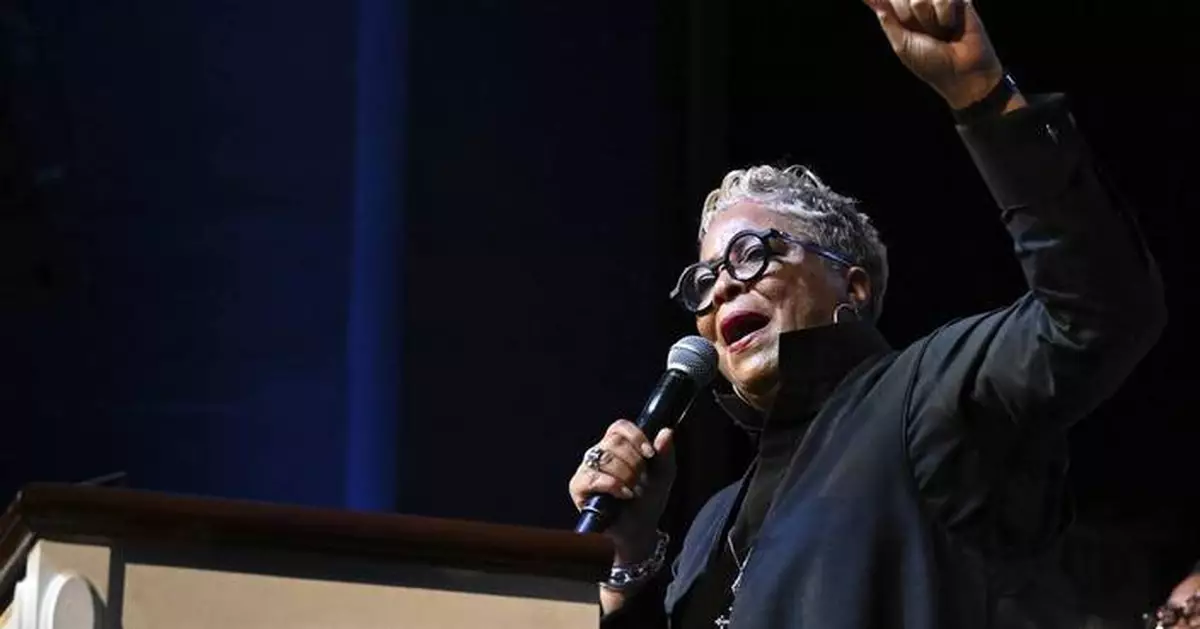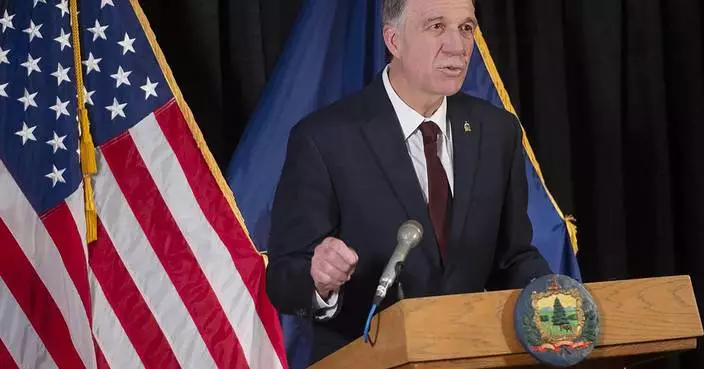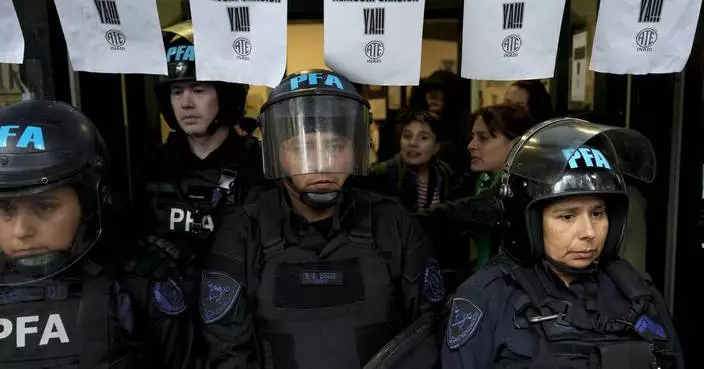No woman had ever preached the keynote sermon at the Joint National Baptist Convention, a gathering of four historically Black Baptist denominations representing millions of people.
That changed in January when the Rev. Gina Stewart took the convention stage in Memphis, Tennessee, — the Southern city home to Christ Missionary Baptist Church where she serves as senior pastor — and delivered a rousing message, asserting that Jesus not only included women in his ministry, but identified with their suffering.
Click to Gallery
Rev. Gina Stewart, left, greets a parishioner after church service at Rankin Chapel, Sunday, April 7, 2024, in Washington. Throughout its long history, the Black Church in America has, for the most part, been a patriarchal institution. Now, more Black women are taking on high-profile leadership roles. But the founder of Women of Color in Ministry estimates that less than one in 10 Black Protestant congregations are led by a woman. “I would hope that we can knock down some of those barriers so that their journey would be just a little bit easier,” said Stewart. (AP Photo/Terrance Williams)
Rev. Gina Stewart, right, hugs a parishioner after church service at Rankin Chapel, Sunday, April 7, 2024, in Washington. Throughout its long history, the Black Church in America has, for the most part, been a patriarchal institution. Now, more Black women are taking on high-profile leadership roles. But the founder of Women of Color in Ministry estimates that less than one in 10 Black Protestant congregations are led by a woman. “I would hope that we can knock down some of those barriers so that their journey would be just a little bit easier,” said Stewart. (AP Photo/Terrance Williams)
Rev. Gina Stewart, third from right, holds hands with students and faculty of Howard University before church service at Rankin Chapel, Sunday, April 7, 2024, in Washington. Throughout its long history, the Black Church in America has, for the most part, been a patriarchal institution. Now, more Black women are taking on high-profile leadership roles. But the founder of Women of Color in Ministry estimates that less than one in 10 Black Protestant congregations are led by a woman. “I would hope that we can knock down some of those barriers so that their journey would be just a little bit easier,” said Stewart. (AP Photo/Terrance Williams)
Rev. Gina Stewart, right, preaches during church service at Rankin Chapel, Sunday, April 7, 2024, in Washington. Throughout its long history, the Black Church in America has, for the most part, been a patriarchal institution. Now, more Black women are taking on high-profile leadership roles. But the founder of Women of Color in Ministry estimates that less than one in 10 Black Protestant congregations are led by a woman. “I would hope that we can knock down some of those barriers so that their journey would be just a little bit easier,” said Stewart. (AP Photo/Terrance Williams)
No woman had ever preached the keynote sermon at the Joint National Baptist Convention, a gathering of four historically Black Baptist denominations representing millions of people.
Rev. Gina Stewart preaches during church service at Rankin Chapel, Sunday, April 7, 2024, in Washington. Throughout its long history, the Black Church in America has, for the most part, been a patriarchal institution. Now, more Black women are taking on high-profile leadership roles. But the founder of Women of Color in Ministry estimates that less than one in 10 Black Protestant congregations are led by a woman. “I would hope that we can knock down some of those barriers so that their journey would be just a little bit easier,” said Stewart. (AP Photo/Terrance Williams)
The Howard University gospel choir performs during church service at Rankin Chapel, Sunday, April 7, 2024, in Washington. Throughout its long history, the Black Church in America has, for the most part, been a patriarchal institution. Now, more Black women are taking on high-profile leadership roles. But the founder of Women of Color in Ministry estimates that less than one in 10 Black Protestant congregations are led by a woman. “I would hope that we can knock down some of those barriers so that their journey would be just a little bit easier,” said Stewart. (AP Photo/Terrance Williams)
Parishioners clap and raise their hands as Rev. Gina Stewart preaches during church service at Rankin Chapel, Sunday, April 7, 2024, in Washington. Throughout its long history, the Black Church in America has, for the most part, been a patriarchal institution. Now, more Black women are taking on high-profile leadership roles. But the founder of Women of Color in Ministry estimates that less than one in 10 Black Protestant congregations are led by a woman. “I would hope that we can knock down some of those barriers so that their journey would be just a little bit easier,” said Stewart. (AP Photo/Terrance Williams)
Rev. Gina Stewart, left, greets a parishioner after church service at Rankin Chapel, Sunday, April 7, 2024, in Washington. Throughout its long history, the Black Church in America has, for the most part, been a patriarchal institution. Now, more Black women are taking on high-profile leadership roles. But the founder of Women of Color in Ministry estimates that less than one in 10 Black Protestant congregations are led by a woman. “I would hope that we can knock down some of those barriers so that their journey would be just a little bit easier,” said Stewart. (AP Photo/Terrance Williams)
Rev. Gina Stewart, right, hugs a parishioner after church service at Rankin Chapel, Sunday, April 7, 2024, in Washington. Throughout its long history, the Black Church in America has, for the most part, been a patriarchal institution. Now, more Black women are taking on high-profile leadership roles. But the founder of Women of Color in Ministry estimates that less than one in 10 Black Protestant congregations are led by a woman. “I would hope that we can knock down some of those barriers so that their journey would be just a little bit easier,” said Stewart. (AP Photo/Terrance Williams)
Rev. Gina Stewart, third from right, holds hands with students and faculty of Howard University before church service at Rankin Chapel, Sunday, April 7, 2024, in Washington. Throughout its long history, the Black Church in America has, for the most part, been a patriarchal institution. Now, more Black women are taking on high-profile leadership roles. But the founder of Women of Color in Ministry estimates that less than one in 10 Black Protestant congregations are led by a woman. “I would hope that we can knock down some of those barriers so that their journey would be just a little bit easier,” said Stewart. (AP Photo/Terrance Williams)
Rev. Gina Stewart preaches during church service at Rankin Chapel, Sunday, April 7, 2024, in Washington.Throughout its long history, the Black Church in America has, for the most part, been a patriarchal institution. Now, more Black women are taking on high-profile leadership roles. But the founder of Women of Color in Ministry estimates that less than one in 10 Black Protestant congregations are led by a woman. “I would hope that we can knock down some of those barriers so that their journey would be just a little bit easier,” said Stewart. (AP Photo/Terrance Williams)
Alumni members of Delta Sigma Theta sorority watch Rev. Gina Stewart preach during church service at Rankin Chapel, Sunday, April 7, 2024, in Washington. Throughout its long history, the Black Church in America has, for the most part, been a patriarchal institution. Now, more Black women are taking on high-profile leadership roles. But the founder of Women of Color in Ministry estimates that less than one in 10 Black Protestant congregations are led by a woman. “I would hope that we can knock down some of those barriers so that their journey would be just a little bit easier,” said Stewart. (AP Photo/Terrance Williams)
Rev. Gina Stewart, right, preaches during church service at Rankin Chapel, Sunday, April 7, 2024, in Washington. Throughout its long history, the Black Church in America has, for the most part, been a patriarchal institution. Now, more Black women are taking on high-profile leadership roles. But the founder of Women of Color in Ministry estimates that less than one in 10 Black Protestant congregations are led by a woman. “I would hope that we can knock down some of those barriers so that their journey would be just a little bit easier,” said Stewart. (AP Photo/Terrance Williams)
Rev. Gina Stewart preaches during church service at Rankin Chapel, Sunday, April 7, 2024, in Washington. Throughout its long history, the Black Church in America has, for the most part, been a patriarchal institution. Now, more Black women are taking on high-profile leadership roles. But the founder of Women of Color in Ministry estimates that less than one in 10 Black Protestant congregations are led by a woman. “I would hope that we can knock down some of those barriers so that their journey would be just a little bit easier,” said Stewart. (AP Photo/Terrance Williams)
But what happened next put a spotlight on the obstacles women in Christian ministry continue to face as they carve out leadership space within the patriarchal culture of the Black Church in America. Several women pastors told The Associated Press that it should serve as the breaking point.
“This is an example of no matter how high you rise as a woman, you’re going to meet patriarchy at the top of the hill,” said Martha Simmons, founder of Women of Color in Ministry, which helps women navigate the process of getting ordained. “The next Norton Anthology of African American preaching is probably 20 years away, but that sermon will be in there.”
Despite the enthusiastic reception for Stewart, the original recording of her historic sermon disappeared from the convention’s Facebook page, setting off a social media firestorm – driven mostly by women – protesting its removal. A recording of the sermon later appeared, but it was followed by accusations the convention edited her closing remarks, which challenges the four allied denominations to support women in ministry.
National Baptist Convention, USA, President Jerry Young did not reply to requests from The Associated Press for comment. He said at another January meeting that he believed the Facebook page had been hacked and he planned to involve the FBI.
“I still don’t know what happened with the sermon, but what is clear is that this was a form of erasure,” Stewart said. “I was just as shocked, stunned and surprised as everyone else.”
It is symptomatic of a larger problem, according to several Black women pastors interviewed by the AP. They emphasized how they were worn down by the physical and psychological toll of working in a male-dominated culture.
In some denominations, women have made progress. The African Methodist Episcopal Church estimates that one-fourth of its total staff are women, including 1,052 ordained ministers.
In the Black Church as a whole, male pastors predominate, though there’s no comprehensive gender breakdown. Simmons estimates that less than one in 10 Black Protestant congregations are led by a woman, even as more Black women are attending seminary.
The conditions aren’t new, but the public discourse over women’s equality in ministry has rapidly gained ground due in large part to the bullhorn social media provides, said Courtney Pace, scholar-in-residence with Memphis-based Equity for Women in the Church. Pace noted how Facebook afforded Eboni Marshall Turman a venue to publicly share her grievances before filing a gender discrimination lawsuit in December against Abyssinian Baptist Church in New York.
The late theologian and civil rights activist Prathia Hall underscores this dynamic, said Pace, who wrote “Freedom Faith: The Womanist Vision of Prathia Hall.” In the book, she details how Hall was a key inspiration for Martin Luther King Jr.’s “I Have a Dream” speech.
“The kind of thing that happened to Gina Stewart happened a lot to Prathia Hall,” Pace said. “When she was doing her work, we did not have social media, or cell phones with voice recorders and cameras in every hand. So who knows what the response to Prathia would have been with an empowered public like we have today.”
Hall was born in Philadelphia in 1940, the daughter of a Baptist preacher. As a youth, she took part in local speech competitions where she melded folk religion and liberation theology.
But not all of Hall’s relationships within the insular preaching fraternity of the National Baptist Convention were as collegial as her relationship with King, whom she said in later years did more with “I have a dream” than she could have.
Many theologically conservative Christian churches, including some Black Protestant denominations, prohibit women from preaching. They frequently cite certain biblical passages, including one they interpret as saying women ought to “be silent” in churches. Even in denominations without explicit bans, women with leadership aspirations often must contend with a patriarchal culture.
Last month, the audience was dotted with young Black women at an event hosted at the Howard Divinity School in Washington. A group convened a panel about the evolution of Black women’s role in the church.
Inside the cavernous Dunbarton Chapel that Howard Divinity shares with the Howard School of Law, a half-dozen Black women representing a range of independent churches and Black Protestant denominations spoke about persevering through instability and transition.
Their current duties, some of the women said, left them exhausted and unable to grieve the members they lost to COVID-19.
One speaker was the Rev. Lyvonne Briggs. In 2019, she was being overworked and underpaid as an assistant pastor of a large Baptist church in California. Her marriage dissolved.
She restarted her life in Atlanta. During the lockdown one Sunday morning in her apartment, Briggs went live on Instagram and held a self-styled worship space for 25 people to share their experiences. It became known as The Proverbial Experience, which Briggs describes as an “African-centered, womanist series of spiritual gatherings to nourish the soul.”
In two years, Briggs grew her church into a digital community of 3,000. She also wrote “Sensual Faith: The Spiritual Art of Coming Back to Your Body,” a treatise on liberation from the sexual politics and objectification of Black women’s bodies in the church setting.
“I don’t ascribe to this idea that the Black Church is dead,” Briggs told the AP. “But I do acknowledge and promote that we have to eulogize what it used to be so that we can birth something new.”
One preacher who fashions himself an expert on the topic of women’s role in the church, Walter Gardner of the Newark Church of Christ in Newark, N.J, sent a video link of one of his lectures when queried by the AP about his beliefs. At the end of one session, Gardner suggested that women, overall, ignore Scripture and are incapable of being taught.
That’s a mindset Gina Stewart would like to change, on behalf of future generations of Black women.
“I would hope that we can knock down some of those barriers so that their journey would be just a little bit easier,” said Stewart, who has continued to charge forward.
In a given week, her preaching schedule can take her to multiple cities. As an example, she traveled to Washington earlier this month after accepting a sought-after invitation to preach at Howard University’s Andrew Rankin Memorial Chapel.
Stewart's goals mesh with those of Eboni Marshall Turman, who gave the Martin Luther King Jr. Crown Forum lecture in February at Martin Luther King’s alma mater, Morehouse College. In December, after not being named a finalist, she had sued Abyssinian Baptist Church and its pulpit search committee for gender discrimination over its hiring process for its next senior pastor, an assertion the church and the committee disputed. No woman has ever held the post.
A former Abyssinian assistant minister, the Rev. Rashad Raymond Moore, said in an email to The Associated Press that of the several dozen applicants for the senior pastor job, “none were more exciting, promising and refreshing than Eboni Marshall Turman.”
Added Moore, who now is pastor of New York City’s First Baptist Church of Crown Heights, “Pastoral searches in Black congregations, historically socially conservative, are often mired in the politics of discrimination, including biases based on gender, sexual orientation, marital status and age.”
Marshall Turman, a Yale Divinity School professor, offered pointed critiques in her first book at what she deemed the inherent patriarchy of Morehouse’s social gospel justice tradition. She adapted her recent lecture’s title from the last speech ever given by King, the all-male college’s most famous alumni.
The title was blunt: “I’m Not Fearing Any Man.”
Associated Press religion coverage receives support through the AP’s collaboration with The Conversation US, with funding from Lilly Endowment Inc. The AP is solely responsible for this content.
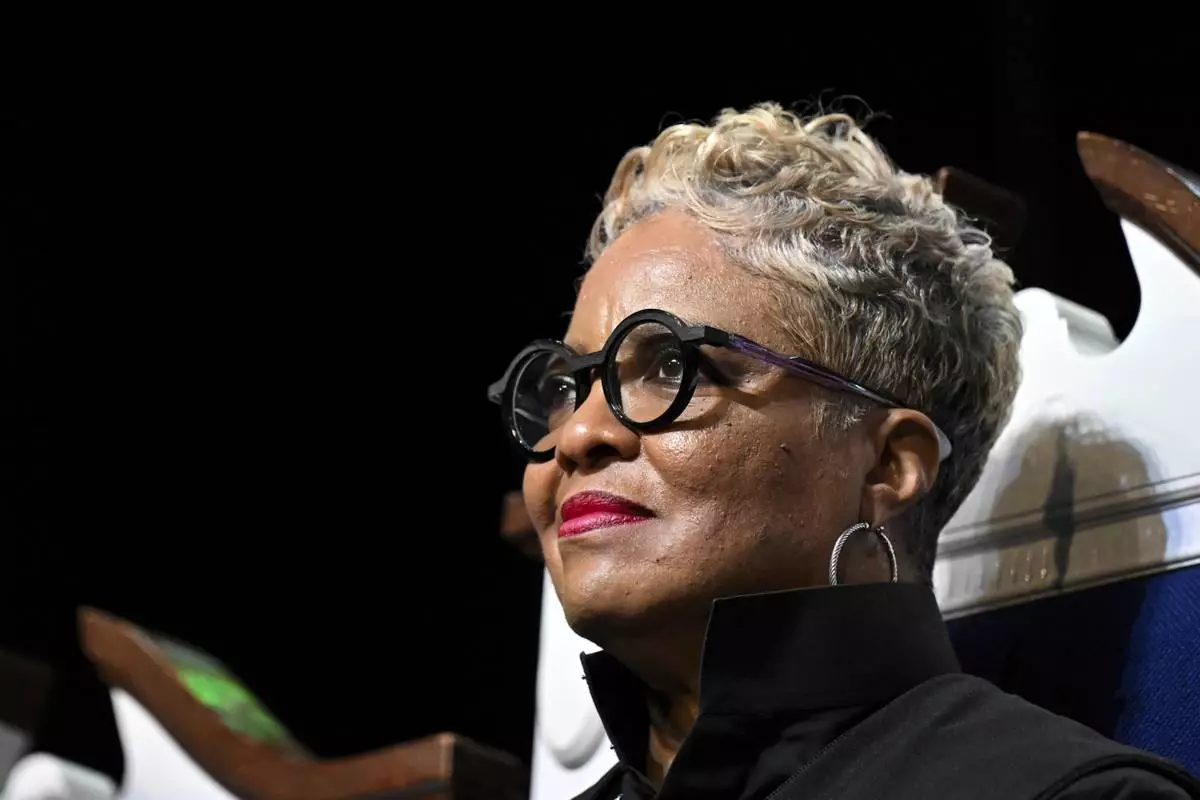
Rev. Gina Stewart looks on during church service at Rankin Chapel, Sunday, April 7, 2024, in Washington. Throughout its long history, the Black Church in America has, for the most part, been a patriarchal institution. Now, more Black women are taking on high-profile leadership roles. But the founder of Women of Color in Ministry estimates that less than one in 10 Black Protestant congregations are led by a woman. “I would hope that we can knock down some of those barriers so that their journey would be just a little bit easier,” said Stewart. (AP Photo/Terrance Williams)
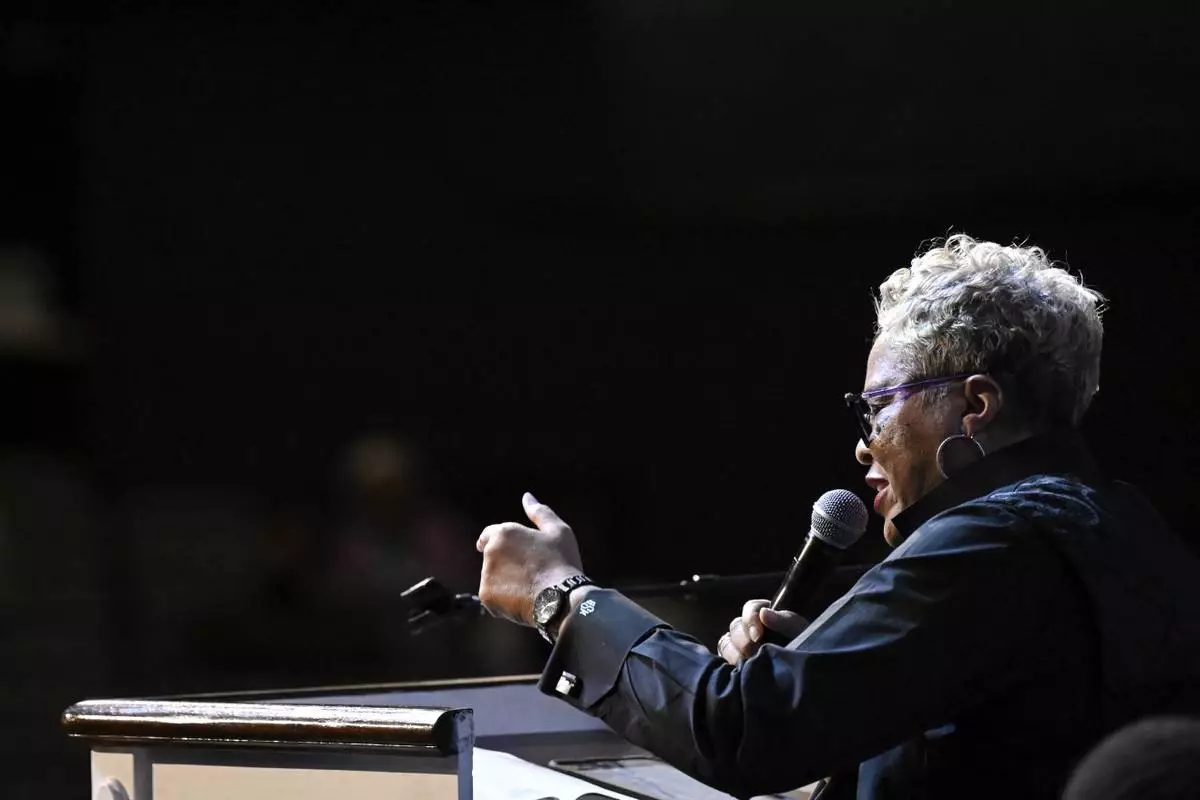
Rev. Gina Stewart preaches during church service at Rankin Chapel, Sunday, April 7, 2024, in Washington. Throughout its long history, the Black Church in America has, for the most part, been a patriarchal institution. Now, more Black women are taking on high-profile leadership roles. But the founder of Women of Color in Ministry estimates that less than one in 10 Black Protestant congregations are led by a woman. “I would hope that we can knock down some of those barriers so that their journey would be just a little bit easier,” said Stewart. (AP Photo/Terrance Williams)
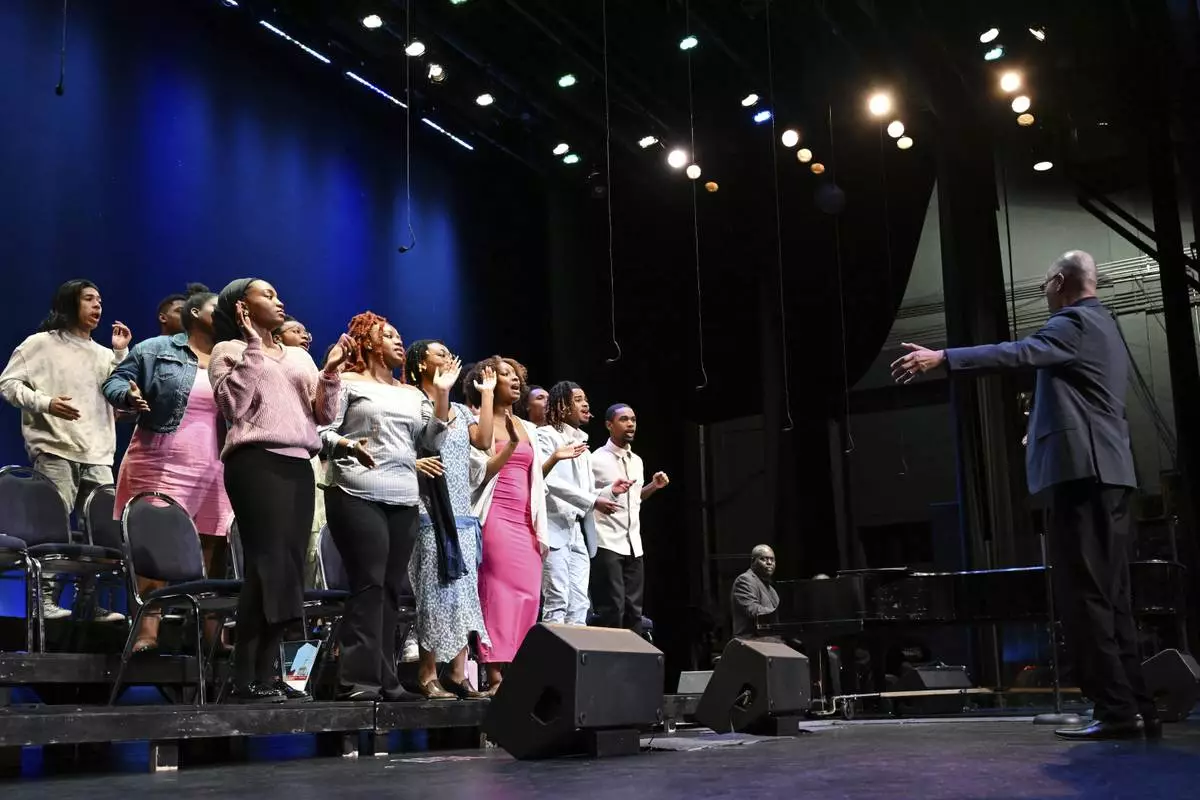
The Howard University gospel choir performs during church service at Rankin Chapel, Sunday, April 7, 2024, in Washington. Throughout its long history, the Black Church in America has, for the most part, been a patriarchal institution. Now, more Black women are taking on high-profile leadership roles. But the founder of Women of Color in Ministry estimates that less than one in 10 Black Protestant congregations are led by a woman. “I would hope that we can knock down some of those barriers so that their journey would be just a little bit easier,” said Stewart. (AP Photo/Terrance Williams)
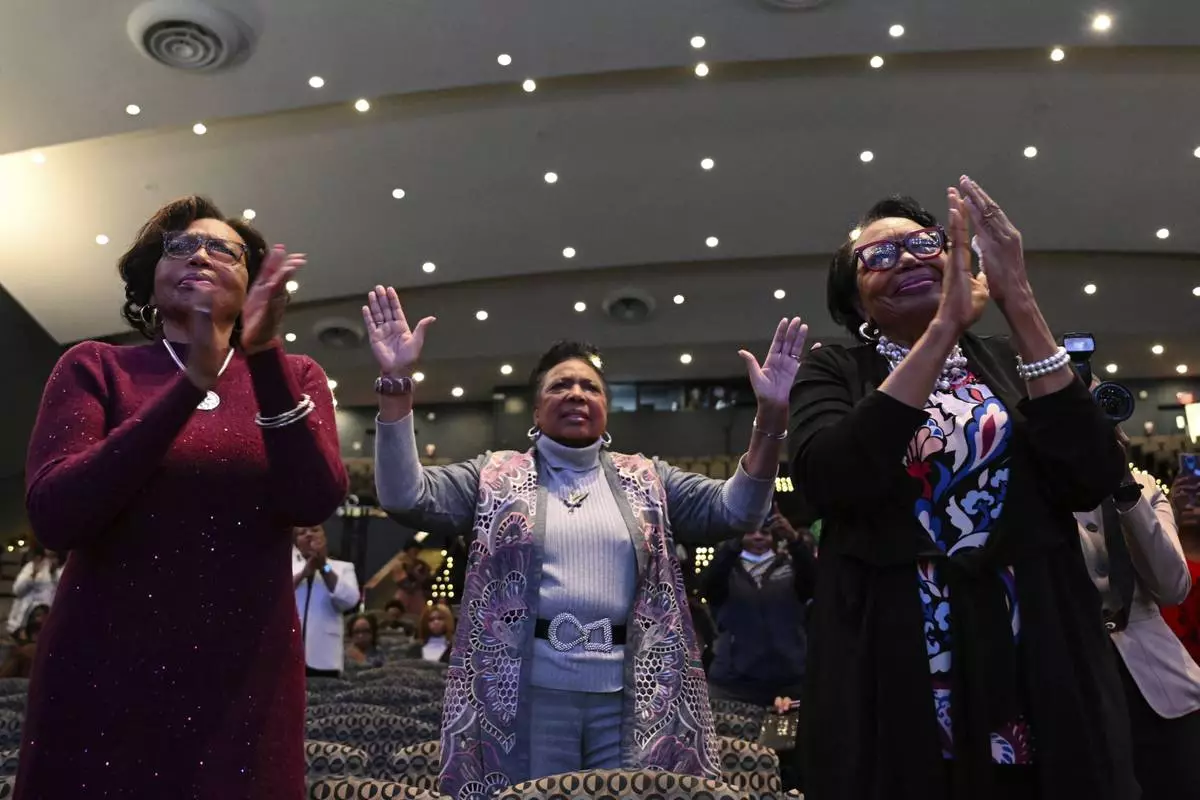
Parishioners clap and raise their hands as Rev. Gina Stewart preaches during church service at Rankin Chapel, Sunday, April 7, 2024, in Washington. Throughout its long history, the Black Church in America has, for the most part, been a patriarchal institution. Now, more Black women are taking on high-profile leadership roles. But the founder of Women of Color in Ministry estimates that less than one in 10 Black Protestant congregations are led by a woman. “I would hope that we can knock down some of those barriers so that their journey would be just a little bit easier,” said Stewart. (AP Photo/Terrance Williams)
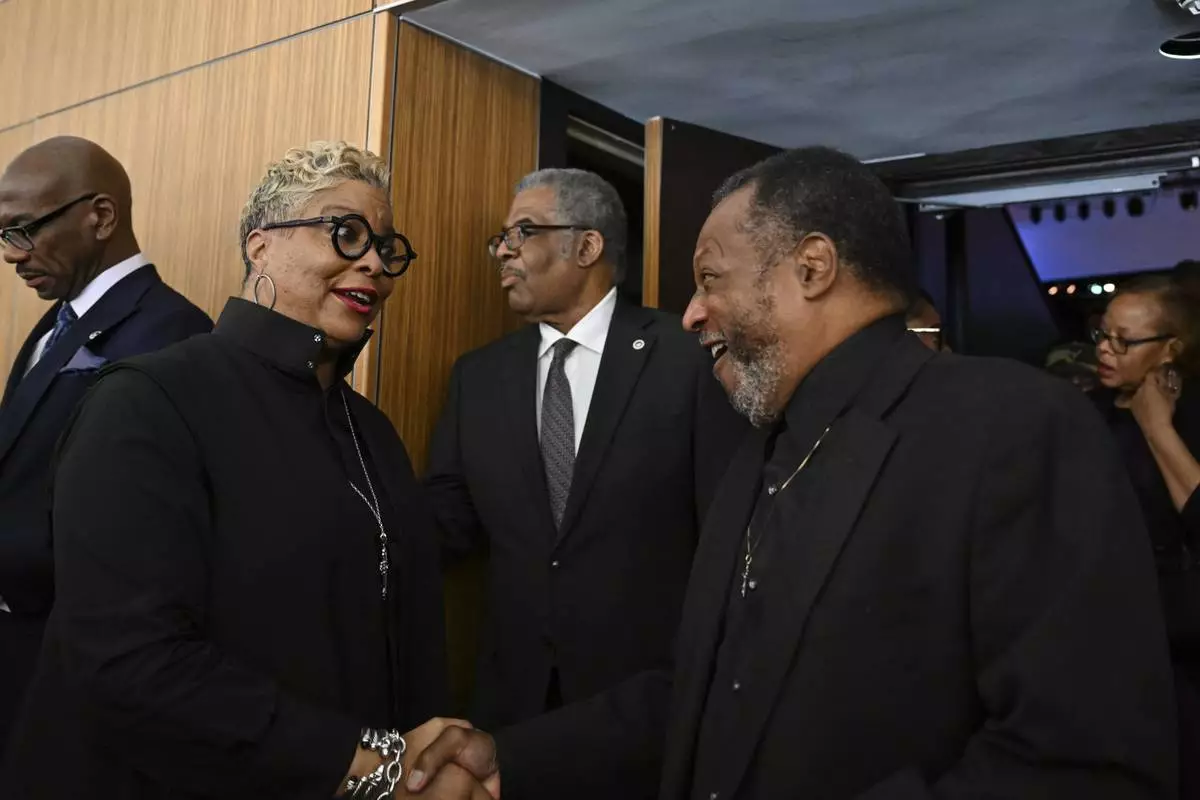
Rev. Gina Stewart, left, greets a parishioner after church service at Rankin Chapel, Sunday, April 7, 2024, in Washington. Throughout its long history, the Black Church in America has, for the most part, been a patriarchal institution. Now, more Black women are taking on high-profile leadership roles. But the founder of Women of Color in Ministry estimates that less than one in 10 Black Protestant congregations are led by a woman. “I would hope that we can knock down some of those barriers so that their journey would be just a little bit easier,” said Stewart. (AP Photo/Terrance Williams)
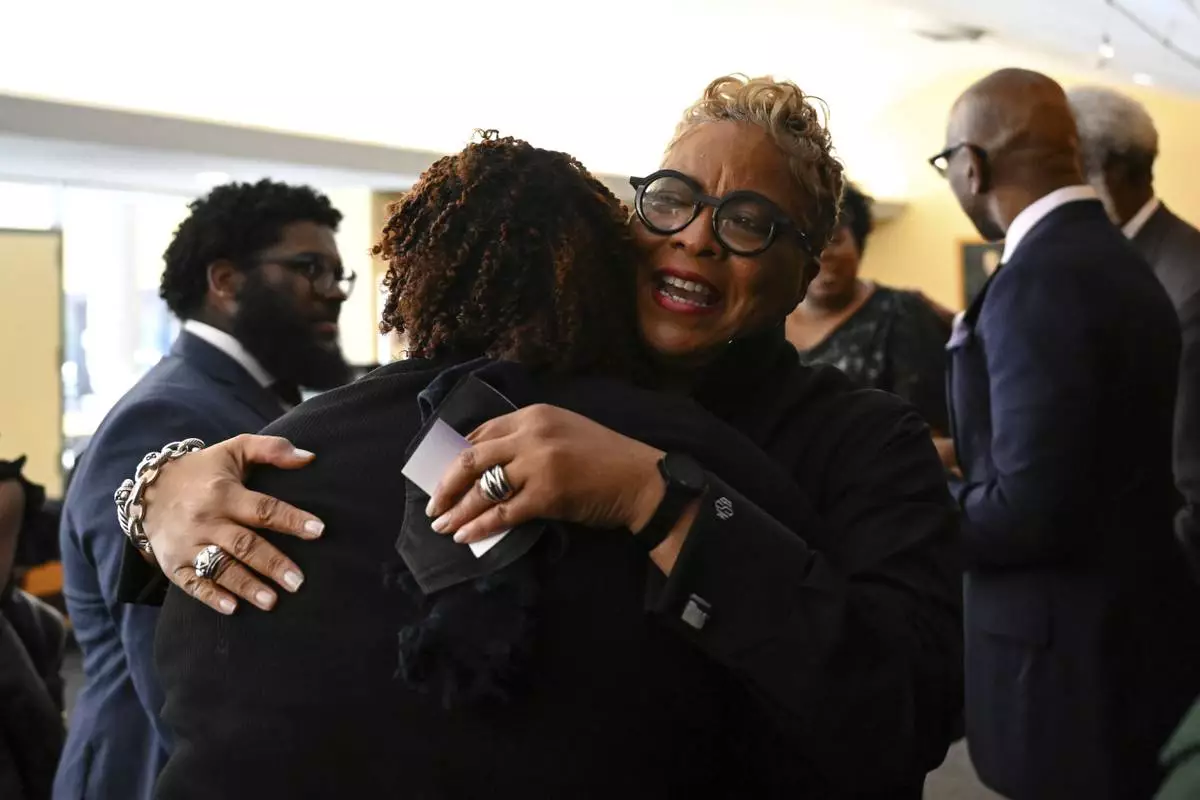
Rev. Gina Stewart, right, hugs a parishioner after church service at Rankin Chapel, Sunday, April 7, 2024, in Washington. Throughout its long history, the Black Church in America has, for the most part, been a patriarchal institution. Now, more Black women are taking on high-profile leadership roles. But the founder of Women of Color in Ministry estimates that less than one in 10 Black Protestant congregations are led by a woman. “I would hope that we can knock down some of those barriers so that their journey would be just a little bit easier,” said Stewart. (AP Photo/Terrance Williams)
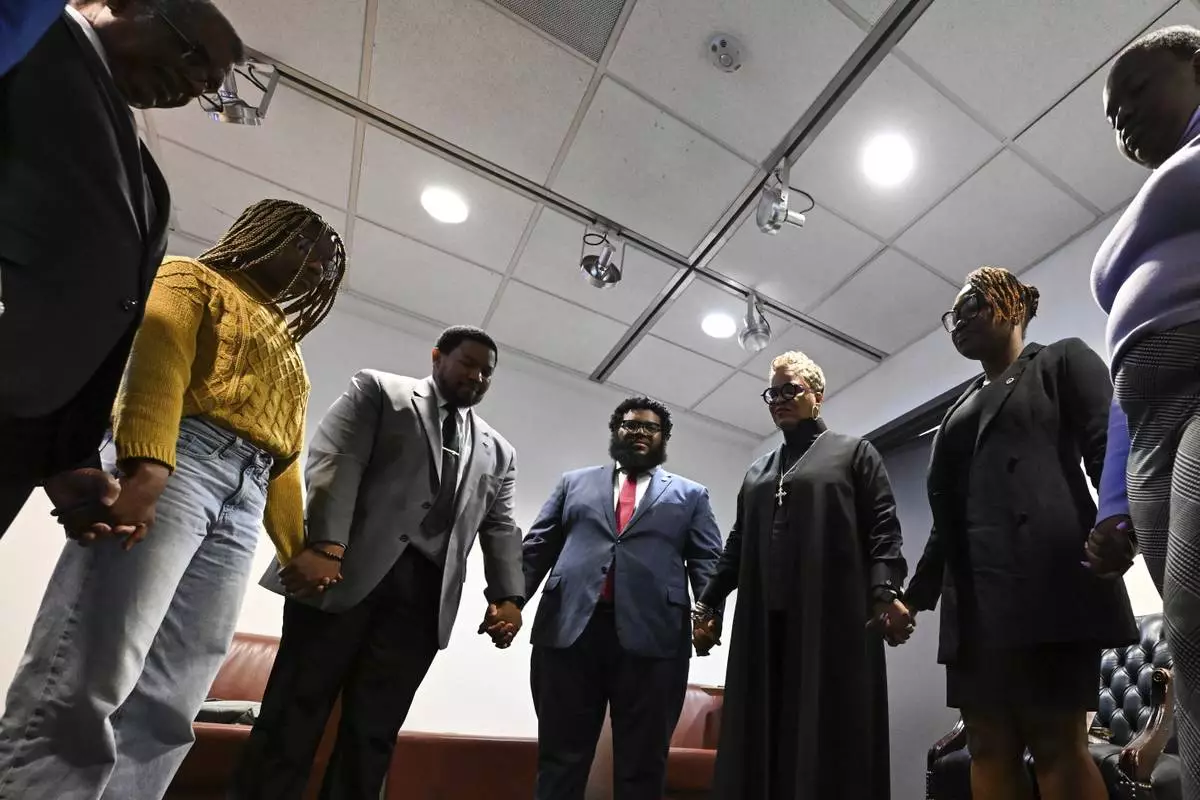
Rev. Gina Stewart, third from right, holds hands with students and faculty of Howard University before church service at Rankin Chapel, Sunday, April 7, 2024, in Washington. Throughout its long history, the Black Church in America has, for the most part, been a patriarchal institution. Now, more Black women are taking on high-profile leadership roles. But the founder of Women of Color in Ministry estimates that less than one in 10 Black Protestant congregations are led by a woman. “I would hope that we can knock down some of those barriers so that their journey would be just a little bit easier,” said Stewart. (AP Photo/Terrance Williams)
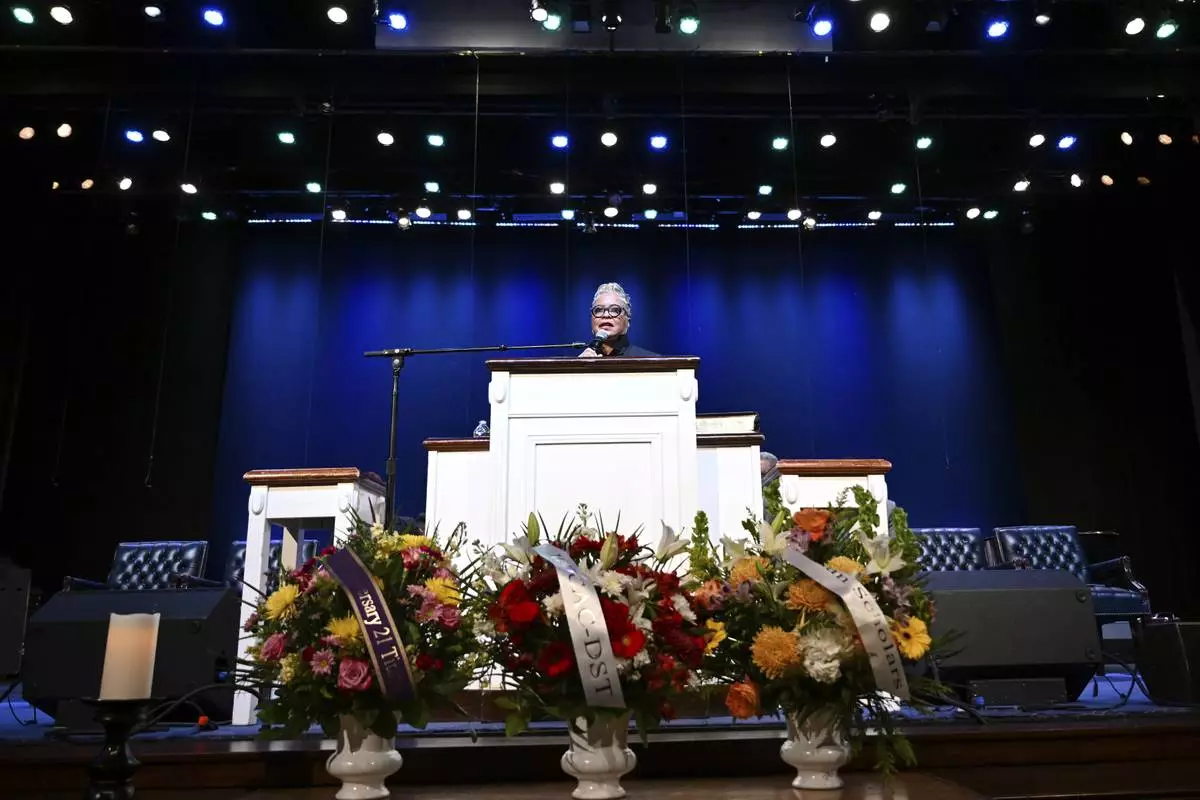
Rev. Gina Stewart preaches during church service at Rankin Chapel, Sunday, April 7, 2024, in Washington.Throughout its long history, the Black Church in America has, for the most part, been a patriarchal institution. Now, more Black women are taking on high-profile leadership roles. But the founder of Women of Color in Ministry estimates that less than one in 10 Black Protestant congregations are led by a woman. “I would hope that we can knock down some of those barriers so that their journey would be just a little bit easier,” said Stewart. (AP Photo/Terrance Williams)
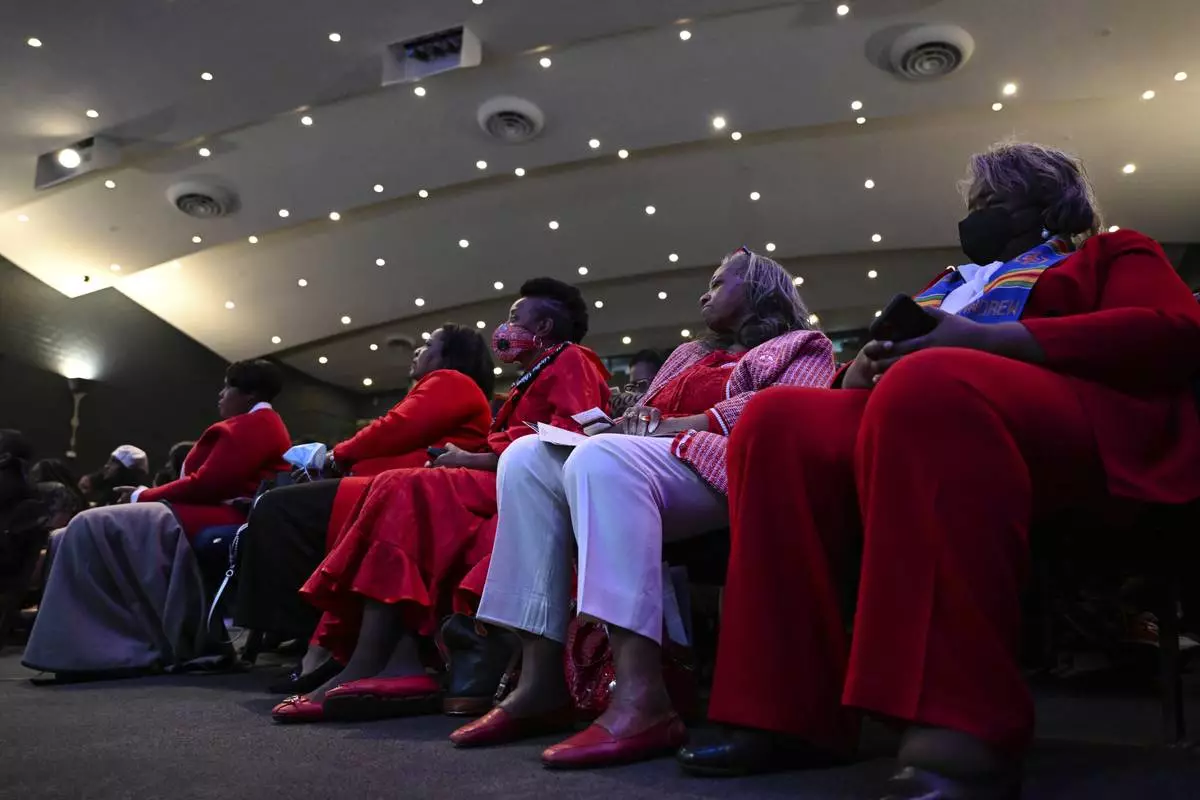
Alumni members of Delta Sigma Theta sorority watch Rev. Gina Stewart preach during church service at Rankin Chapel, Sunday, April 7, 2024, in Washington. Throughout its long history, the Black Church in America has, for the most part, been a patriarchal institution. Now, more Black women are taking on high-profile leadership roles. But the founder of Women of Color in Ministry estimates that less than one in 10 Black Protestant congregations are led by a woman. “I would hope that we can knock down some of those barriers so that their journey would be just a little bit easier,” said Stewart. (AP Photo/Terrance Williams)
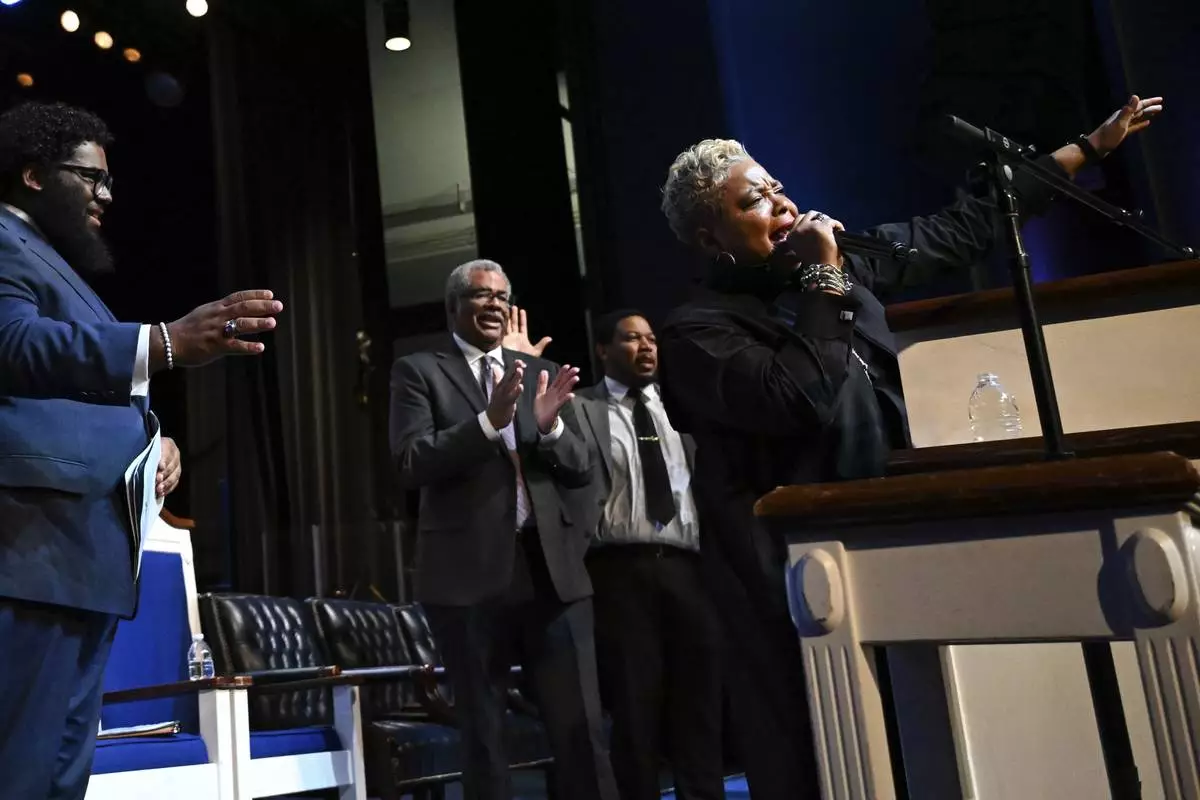
Rev. Gina Stewart, right, preaches during church service at Rankin Chapel, Sunday, April 7, 2024, in Washington. Throughout its long history, the Black Church in America has, for the most part, been a patriarchal institution. Now, more Black women are taking on high-profile leadership roles. But the founder of Women of Color in Ministry estimates that less than one in 10 Black Protestant congregations are led by a woman. “I would hope that we can knock down some of those barriers so that their journey would be just a little bit easier,” said Stewart. (AP Photo/Terrance Williams)
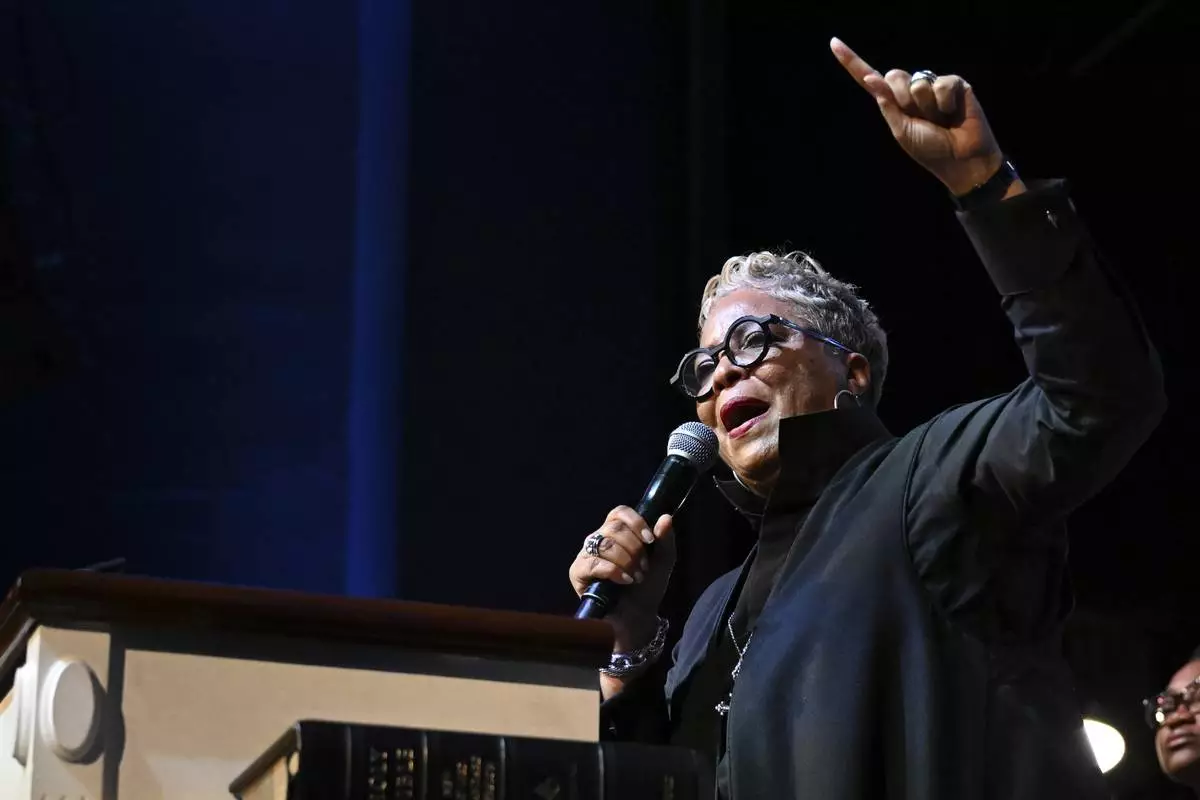
Rev. Gina Stewart preaches during church service at Rankin Chapel, Sunday, April 7, 2024, in Washington. Throughout its long history, the Black Church in America has, for the most part, been a patriarchal institution. Now, more Black women are taking on high-profile leadership roles. But the founder of Women of Color in Ministry estimates that less than one in 10 Black Protestant congregations are led by a woman. “I would hope that we can knock down some of those barriers so that their journey would be just a little bit easier,” said Stewart. (AP Photo/Terrance Williams)
CHARLESTON, W.Va. (AP) — When West Virginia Republicans vote in Tuesday's primary, they will have a hard time finding a major candidate on the ballot in any statewide race who openly acknowledges that President Joe Biden won the 2020 election.
Embracing or skirting the line on election denialism has become an unspoken checkoff among Republicans running for governor and Congress in one of the states most loyal to former President Donald Trump. What is spoken — almost constantly — is praise for the party's presumptive White House nominee from a slate of candidates that includes a convicted Jan. 6 insurrectionist as well as the sons of two GOP members of West Virginia's congressional delegation.
Glenn Elliott, who is seeking the Democratic nomination for an open Senate seat, said denying the election outcome was a “purity test" for West Virginia Republicans.
“You’re either with the leader of the party on everything, or you’re kicked out. You’re not a Republican anymore, you’re a ‘RINO,’” he said, using the acronym for “Republicans In Name Only.” "That’s not a party — that’s a cult.”
It's about the worst thing you can call a Republican candidate in West Virginia.
In the crowded governor’s race, Secretary of State Mac Warner has said he “firmly” believes, like Trump, that the election was stolen, even though dozens of courts and audits have determined the race was fairly decided in Biden's favor.
Warner, whose office oversees West Virginia's elections, has said tech companies, the media and federal intelligence officials worked together to cover up incriminating information found on the laptop of Biden’s son Hunter. Warner's statements came a few months after announcing his campaign after years of toeing the line on the 2020 election. The Army veteran said his views have nothing to do with running for office.
“Donald Trump won West Virginia in a landslide,” former state lawmaker Moore Capito, another candidate for governor, said in response to a question from The Associated Press. “And I just wish that the rest of the country would run our elections like we do here in the state of West Virginia.”
Other candidates hedge or do not answer directly.
Attorney General Patrick Morrisey has refused to provide a yes or no answer to questions about whether Biden won the 2020 race but has asserted that there were “huge irregularities,” “significant irregularities,” and “very, very severe issues” relating to that vote.
Businessman Chris Miller, also a candidate for governor and the son of U.S. Rep. Carol Miller, said people do not trust mail-in ballots. He did not say whether he thought Biden was the legitimate winner.
"If you are voting in-person and see your vote cast, that’s one thing," he said. With mail-in ballots, he added, “You can’t see it. You don’t know what’s happened, and that’s the danger."
Derrick Evans, a former state lawmaker who spent three months in prison for participating in the riot at the U.S. Capitol on Jan. 6, 2021, has escalated his verbal attacks against his primary rival. He calls Carol Miller a “commie RINO” who “refused to stand and fight with President Trump,” as well as an “undocumented Democrat.”
Never mind that Miller was aligned with Trump in almost 100% of her House votes while he was in office.
Evans, in an interview, said he believes his willingness to stand by Trump and say the election was stolen will carry him to victory — even though Miller, hours after Evans and other rioters had stormed the Capitol, voted to challenge the Electoral College results in two states Biden won.
She said in a statement at the time that she had a constitutional duty to “ensure that all Americans have access to free, fair, and accurate elections.”
Evans is undeterred, claiming his role in the violent attack on the Capitol as a badge of honor.
“I think when the people learn I’m the only elected legislator in the entire country who had the courage to stand up against the stolen election and had the courage to stand up beside of President Trump on Jan. 6," he said, “I think that that makes them realize very seriously that I am the guy to represent this district on a national stage.”
In an email to the AP, Carol Miller did not directly address the 2020 result. But she said she is the only candidate in the race who "has never been a registered Democrat or run for office as a Democrat.”
In the West Virginia governor's race, all four major candidates are in lockstep on supporting the state’s coal industry, imposing stiffer penalties for fentanyl dealers and the importance of economic development.
Morrisey, the fundraising front-runner, tossed the “RINO” label at Capito, who is regarded as his main competitor. Morrissey cited a February 2024 social media post from Donald Trump Jr. criticizing a vote by Capito's mother, Republican Sen. Shelley Moore Capito, to send aid to Ukraine. “She’s not up for reelection this year, but her RINO son is running for Governor of West Virginia," Trump Jr. said. “MAGA – Send a message to the Ukraine First RINOs & OPPOSE,” he said, referring to Donald Trump's “Make American Great Again” movement.
Morrisey, in an interview, connected the dots.
“I think the choice is very clear: You have a conservative fighter with a record of getting big things done, and you have members of political royalty, part of the liberal establishment,” Morrisey said.
Moore Capito has since taken every opportunity to make sure voters know where his loyalty lies. In a Republican gubernatorial forum hosted by television station WSAZ, candidates were asked what they could do to help people on fixed incomes struggling to pay their bills amid frequent utility rate increases.
“That’s why it’s incredibly important that we elect Donald Trump as president,” Capito said, after condemning a recently released Biden administration rule that would force coal-fired power plants to capture their emissions or shut down.
Ironically, Republican Gov. Jim Justice, who is running for the Senate seat held by retiring Democrat Joe Manchin, is the only candidate to garner the coveted Trump endorsement in any primary race. And Justice has disagreed with Trump more than most candidates. For example, the governor supported the bipartisan infrastructure act that poured millions of dollars into the state to build out broadband and roads.
Alex Mooney, a congressman running against Justice in the primary, has called Justice a “RINO” at every opportunity. Justice, a former billionaire businessman with a folksy personality that has won him a devoted following, was initially elected as a Democrat in 2017 before becoming a Republican at a Trump rally early in his term. Mooney voted against the infrastructure bill.
Mooney has said he recognizes Biden as president but feels the 2020 election was not a fair one. He voted not to certify Biden's victory in Pennsylvania.
Justice, asked during a news briefing this past week whether he thinks Biden won legitimately, took a defiant tone even as he hedged: “What does it matter? I mean, what in the world does it matter?"
The governor then spun a story he hass told often about something his father told him when he was competing in golf tournaments as a young man.
“Dad would tell me, ‘Son, the only shot that matters in golf is the next shot. If you made a hole in one as your last shot, well, so what?"

FILE - U.S. Rep. Carol Miller, R-W.Va., is shown Feb. 5, 2020, during a subcommittee meeting on Capitol Hill in Washington. Miller is seeking the Republican nomination in West Virginia's 1st Congressional District against challenger Derrick Evans on Tuesday, May 14, 2024. (AP Photo/Patrick Semansky, File)

FILE - West Virginia Gov. Jim Justice delivers his annual State of the State address in the House Chambers of the state Capitol, Jan. 11, 2023, in Charleston, W.Va. When West Virginia Republican primary voters head to the polls Tuesday, May 14, 2024, they'll have a hard time finding a major candidate on the ballot in any statewide race who openly acknowledges U.S. President Joe Biden as the winner of the 2020 election. (AP Photo/Chris Jackson, File)

FILE - West Virginia gubernatorial candidate Mac Warner speaks to supporters at a campaign event at the Charleston Women's Club in Charleston, W.Va., Thursday, May 4, 2023. When West Virginia Republican primary voters head to the polls Tuesday, May 14, 2024, they'll have a hard time finding a major candidate on the ballot in any statewide race who openly acknowledges U.S. President Joe Biden as the winner of the 2020 election. (AP Photo/Jeff Dean, File)

FILE - West Virginia Attorney General Patrick Morrisey speaks during a press conference at the state Capitol, Thursday, May 4, 2023 in Charleston, W.Va. When West Virginia Republican primary voters head to the polls Tuesday, May 14, 2024, they'll have a hard time finding a major candidate on the ballot in any statewide race who openly acknowledges U.S. President Joe Biden as the winner of the 2020 election. (AP Photo/Jeff Dean, File)

FILE - Rep. Alex Mooney, a Republican candidate for U.S. Representative for West Virginia's 2nd Congressional District, addresses a campaign rally at the Westmoreland Fair Grounds in Greensburg, Pa., May 6, 2022. When West Virginia Republican primary voters head to the polls Tuesday, May 14, 2024, they'll have a hard time finding a major candidate on the ballot in any statewide race who openly acknowledges U.S. President Joe Biden as the winner of the 2020 election. (AP Photo/Gene J. Puskar, File)

FILE - In this image provided by the West Virginia Legislative Photography, Derrick Evans is shown during his swearing-in ceremony to the West Virginia House of Delegates on Dec. 1, 2020, in Charleston, W.Va. When West Virginia Republican primary voters head to the polls Tuesday, May 14, 2024, they'll have a hard time finding a major candidate on the ballot in any statewide race who openly acknowledges U.S. President Joe Biden as the winner of the 2020 election.(Will Price/West Virginia Legislative Photography via AP, File)

CORRECTS SPELLING TO MORRISEY NOT MORRISERY FILE - West Virginia gubernatorial candidates, from left, Mac Warner, Chris Miller, moderator and MetroNews Radio host Hoppy Kercheval, Attorney General Patrick Morrisey, speaking, and Moore Capito participate in a GOP debate held at The Resort at Glade Springs, Feb. 6, 2024, in Daniels, W.Va. When West Virginia Republicans vote in the primary on Tuesday, May 14, they will have a hard time finding a major candidate on the ballot in any statewide race who openly acknowledges that President Joe Biden won the 2020 election. (Rick Barbero/The Register-Herald via AP, File)













